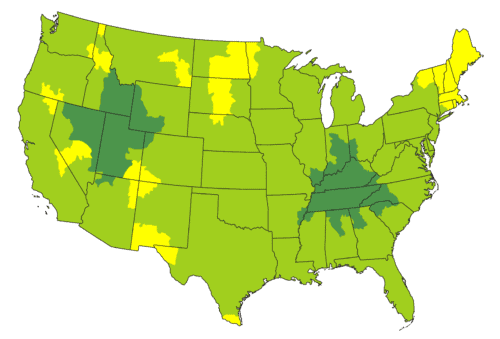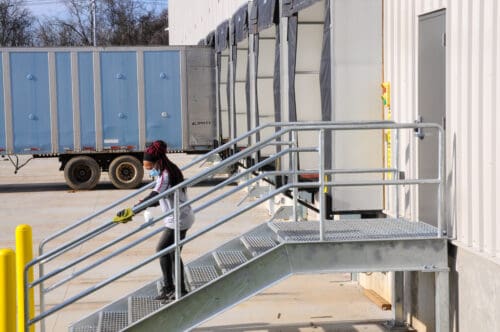Ecommerce can erase borders for sellers. But your online store is only open to the whole world if you have access to global fulfillment services.
Because shipping ecommerce orders to other countries can involve complex paperwork, it’s a good idea to work with a 3PL rather than handling your own global order fulfillment process.
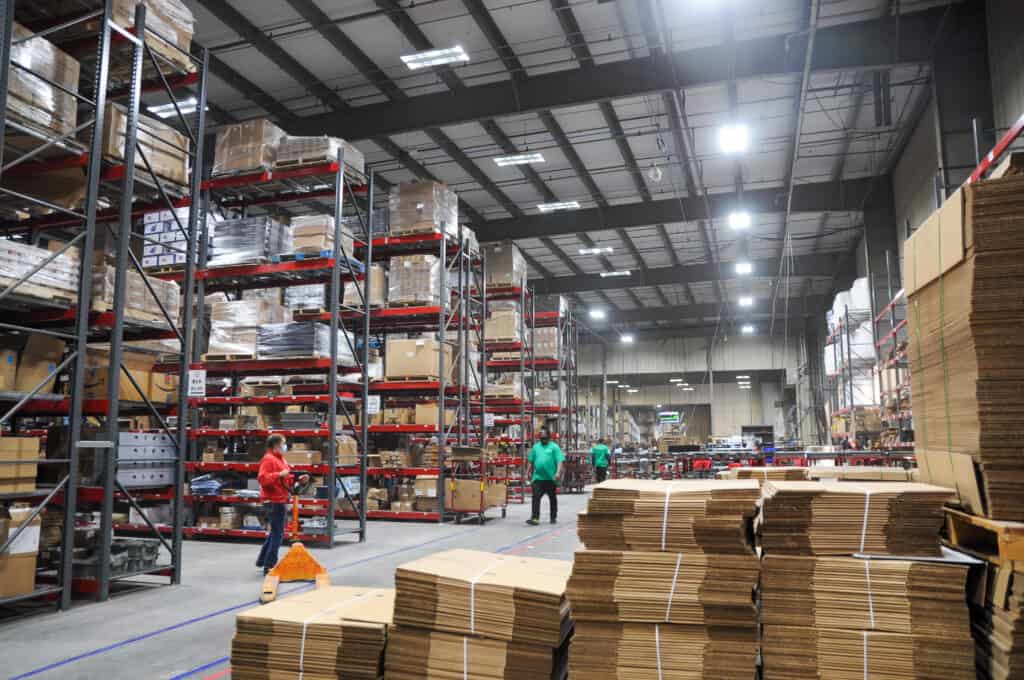
The importance of international fulfillment in ecommerce
Global ecommerce sales is expected to grow to nearly $10 trillion by 2027. China is the world’s biggest ecommerce market, with its sales growing even more quickly than those in North America and Europe.
Tapping into global markets can be as simple as adding international shipping options to your ecommerce site. Making it easier for people in other countries to order your products is a terrific way to increase your revenue.
But selling internationally can be complicated. Cross-border shipping can require customs paperwork plus tariffs and duties. High shipping costs or long transit times can discourage buyers in other countries. To solve these problems, turn to a fulfillment provider, like a 3PL, that specializes in global fulfillment.
What global services do ecommerce fulfillment centers provide?
Along with standard services like efficient order fulfillment and inventory management, a global ecommerce fulfillment center can provide expert assistance with customs paperwork and returns processing. This helps keep international fulfillment affordable.
Some 3PLs have international warehouse locations. If you do a lot of ecommerce business in another country, a local fulfillment provider can save you money on shipping. Plus, your overseas 3PL may be able to offer local knowledge and better shipping options for that country.
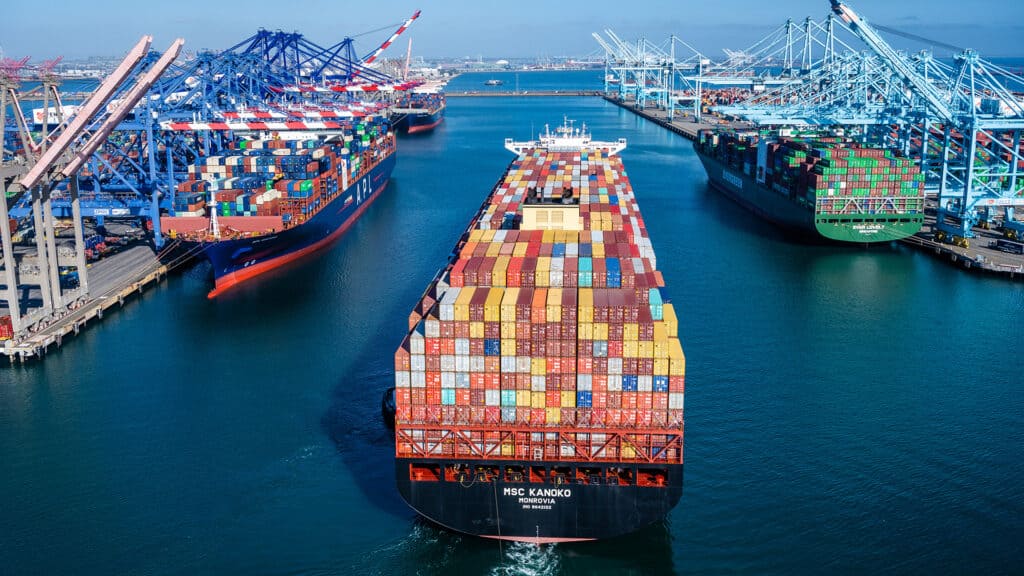
However, many ecommerce companies ship to lots of countries around the world. You might not want or need to stock warehouses in each nation. Instead, the same 3PL that handles your national fulfillment can ship your international orders across borders.
Some of the global order fulfillment services you can get from an ecommerce fulfillment center in your home country include:
Shipping internationally with DHL or one of the three major U.S. carriers. FedEx, UPS, and USPS all offer international shipping options.
- Customs brokering, either through an in-house service or by contracting with a third-party customs expeditor. Customs brokers are experts at navigating the complexities of moving products across international borders. Working with a customs expert will help ensure your packages get through and don’t get held up at the border.
- Package consolidation can simplify your global fulfillment process and reduce international shipping charges. Combining multiple products into a single box may also reduce the cost of customs paperwork.
- Omnichannel fulfillment will give your international customers, both domestic and international, a unified brand experience.
The bottom line is that the world is your marketplace, and if your 3PL can provide global ecommerce fulfillment and inventory management services, it can be beneficial to your business.
Using a North American fulfillment center for global ecommerce fulfillment
Global ecommerce fulfillment centers are an asset to businesses based in other countries that want to break into the lucrative North American market.
For instance, many companies use an ecommerce fulfillment provider with multiple fulfillment centers in the U.S. to handle inventory management and ship orders to American customers
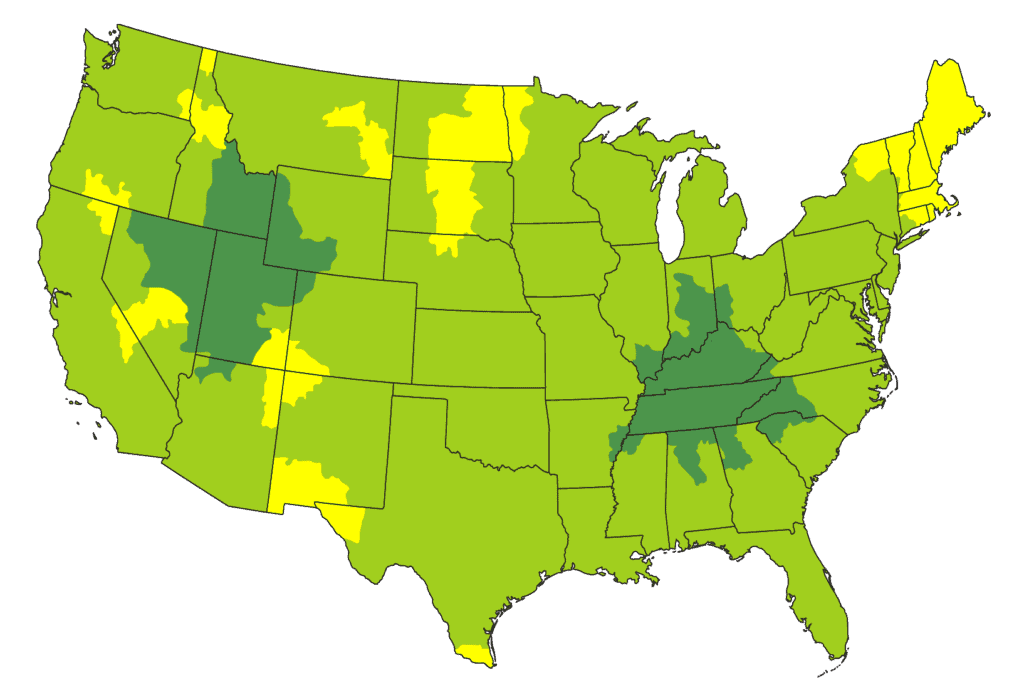
Sending inventory via international freight and shipping orders from a U.S. ecommerce fulfillment center has several advantages:
- You’ll still encounter customs paperwork and import duties on entry to the U.S., but the paperwork can be completed by the container load rather than for each individual order.
A U.S. 3PL will have warehouse locations to reach your North American customers more quickly, so you can offer faster delivery times.
- Being close to your customers will also reduce your shipping costs per order.
International companies that want to sell in the U.S. often find it helpful to use a North American fulfillment provider to fulfill orders. But before shipping orders from a U.S. fulfillment network, there are a few things you might need to know.

What global ecommerce companies need to know before working with a U.S. 3PL
In addition to customs and duties, there are financial and legal considerations when using a global ecommerce fulfillment partner to ship orders from a warehouse in a second country.
Each country will have unique laws and regulations to take into consideration.
Here are some of the basics for international companies that need U.S. order fulfillment and shipping services.
Payment options
No matter what country you’re selling to or from, it’s crucial to offer payment options that customers expect and trust. This is a great way to boost customer satisfaction and increase sales.
Fortunately, there are several payment gateways that online shoppers trust around the world:
- PayPal
- Google Pay
- Apple Pay
- Amazon Pay
- Square
These gateways store credit card and bank information for speedy checkout. You should also offer people the option to enter their credit card information directly at checkout. Reputable payment options are crucial to your international fulfillment process.
Business licenses and permits
In addition to forming a business entity, you’ll need to obtain business permits and licenses.
Here are some of the permits your business may need in order to access global fulfillment and order management services in the U.S.
Fictitious Business Name or DBA
If you want to use a trade name in the U.S., you’ll need to file paperwork to claim and protect your name. This is often called a fictitious business name or DBA (doing business as).
At this step of the process, it’s also a good idea to research your chosen business name to ensure it hasn’t already been taken.
Sales tax permits
If you sell products subject to sales tax, you will need a permit to collect it. Each state has different sales tax requirements, so you may need permits in more than one state.
Business license
Many cities require businesses to obtain a business license each year. You’ll probably need one for each location where you have a physical presence, such as warehouses and fulfillment centers. The cost of a business license varies.
Import license
You might need an import license to bring your products in from another country.
Other licenses and permits
Your business could be subject to other licensing and permitting requirements. For example, if you sell food products, you will probably need permits and inspections from the health department.
U.S. labeling requirements
You may need special packaging for the U.S. market. Federal labeling requirements for the products you sell in the U.S. market depend on the product. Food products are subject to the Fair Packaging and Labeling Act (FPLA).
This lays out requirements for packaging to include information such as net quantity and nutritional information. Imported products must list the country of origin. Most federal labeling regulations are in the NIST Handbook 130.
In addition, some products may be subject to additional labeling rules imposed by government agencies that regulate that category of product.
You might also need to comply with state labeling laws as part of your fulfillment process. For example, California requires a Proposition 65 warning on any product that contains materials the state deems hazardous.
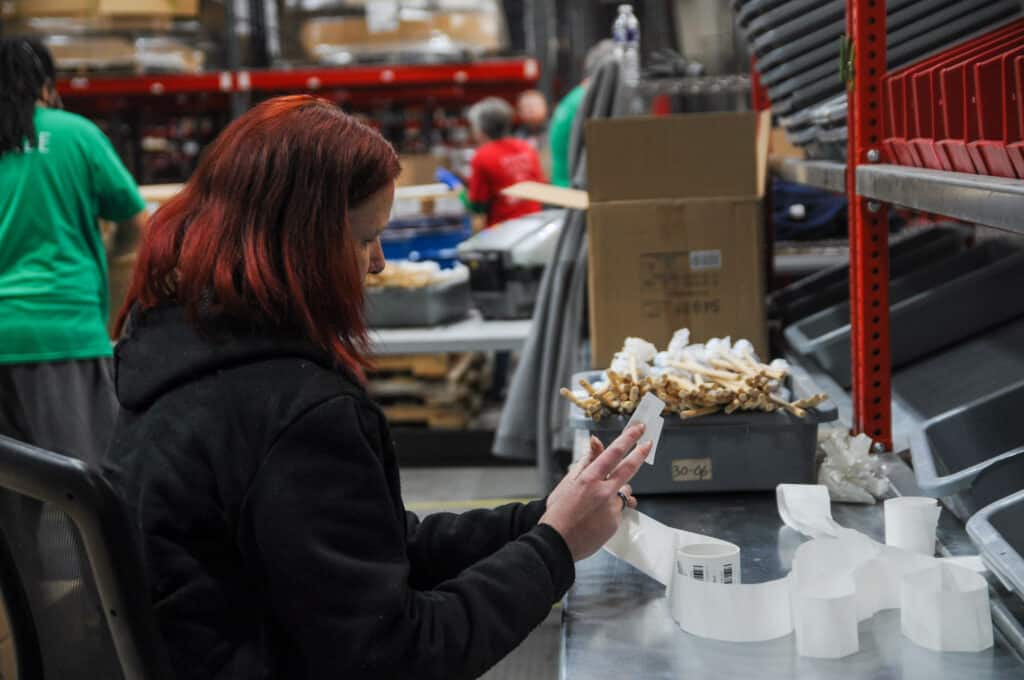
Product certifications are optional on your packaging, but they could increase your sales. For example, Underwriters Laboratories gives manufacturers the right to add the UL logo to products that have passed safety testing.
The U.S. government offers Energy Star certification to appliances that meet energy-saving standards. A certification from a trusted entity such as this can help build confidence in your products among U.S. consumers.
Opening a U.S. bank account
One of the first things you’ll need to do when you take advantage of a global network of fulfillment services in the U.S. is to open a U.S. bank account. You’ll need funds in the U.S. to pay for your U.S. operations.
Some suppliers (including Red Stag Fulfillment) require clients to pay from a U.S. bank account. Holding at least some of your U.S. earnings in dollars will also save you wire transfer and exchange fees.
However, opening a business bank account can be a challenge for a foreign national. Adam Barker is the COO of Yumi Nutrition Ltd., a U.K.-based company that has expanded into the U.S.
He advises business owners to set aside at least two days to work with U.S. banks to set up an account. He suggests bringing printouts of all paperwork, including SS4 and EIN numbers and proof of the business address. Be prepared to come to the U.S. and take care of this in person. You won’t be able to open a U.S. bank account from abroad.
Barker also shared these best practices:
“The best way to get a proof of address for a U.S. business is to get a fax from the IRS confirming the EIN number. The issues arise when you find out the bank cannot accept foreign nationals who own a business entity, so it’s better to clear that up as soon as possible. The two most helpful banks on this, from my experience, are Chase and Citibank.”
Paying taxes in the U.S.
There are several different types of taxes in the U.S.
Depending on what you sell and how your business is structured, you may need to file sales tax returns as often as once a month, as well as federal and state tax returns. If you have U.S. employees, you’ll also need to pay payroll taxes.

Adam Barker has a tip for dealing with U.S. taxes:
“Get an accountant or CPA. Don’t go for big firms, as they will charge a lot to file basic returns. Small firms or one-man bands set up in your incorporation state to navigate your end-of-year filings will be sufficient.”
If you can start doing tax planning at the beginning of the process of forming your U.S. corporation, you’ll do yourself a favor. Tax issues may affect your decision about what type of business entity to choose if you set up a U.S. corporate entity.
Sales taxes
Sales tax laws in the U.S. are complex. Five states have no sales tax at all. Some states have a single sales tax rate, and some have many different rates. Some products are taxed in one state but not another. For example, most clothing is not subject to sales tax in New Jersey, but it is taxed in California (and many other states).
If your product is taxable, you will need to get a sales tax license for the state where your headquarters is located. In addition, you’ll need to get a license and collect sales tax for sales in states where you have a warehouse space or at least one employee.
On top of that, many states require remote sellers to collect sales tax. Nexus (the requirement to collect and remit sales tax) is triggered if you sell a certain amount into that state each year. This can create headaches for ecommerce businesses that ship products to every state.
Fortunately, there are many different types of sales tax software to help global ecommerce sellers figure out where they should collect sales tax.
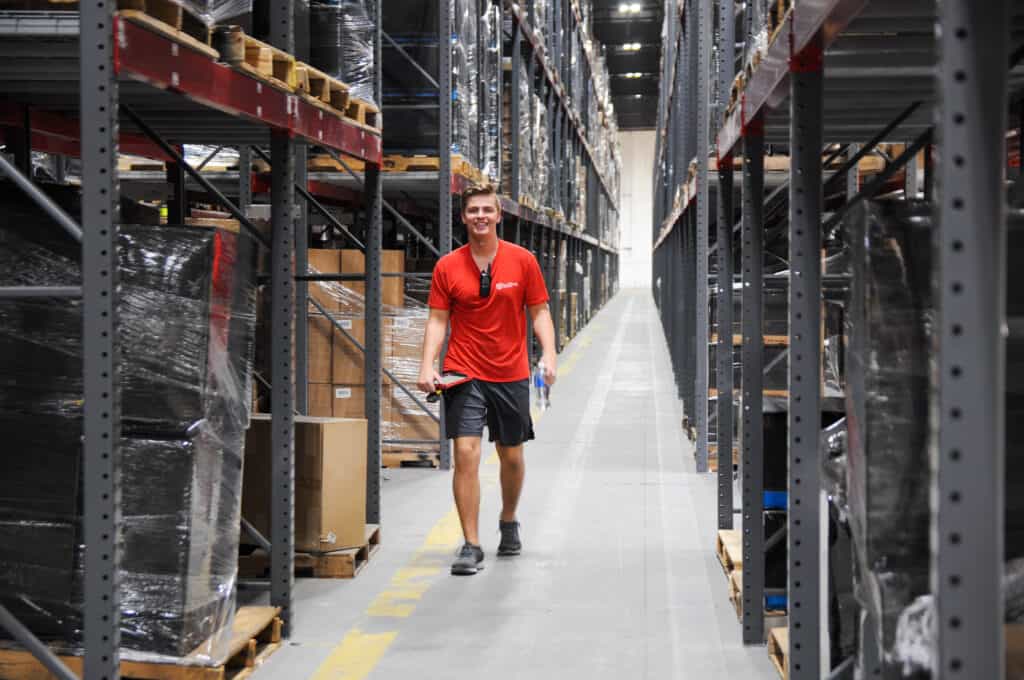
How Red Stag Fulfillment puts global fulfillment within your reach
At Red Stag Fulfillment, we serve as an international fulfillment partner to help each of our clients grow and scale their businesses in the U.S.
In addition to our integrations, kitting services, fulfillment guarantees, and inventory management and planning assistance, we offer global ecommerce fulfillment services to all our clients.
We can help with freight forwarding and other challenges of managing a global supply chain to serve customers around the world.
Red Stag is committed to being a true international fulfillment partner, delivering customized solutions—no matter where your ecommerce business is based.
Our focus on personalized customer service gives us the flexibility to help you solve whatever obstacles you face to provide seamless fulfillment to your international customers. If you have questions about international fulfillment, let us know. We’ll help you find the answers you need.
More about global fulfillment services:
- Your Ultimate Guide to International ECommerce Expansion ecommerce
- How to Ship Internationally in 7 Steps
- Is Package Consolidation Right for You?








